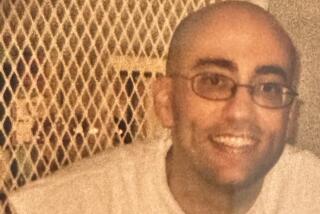‘Freeway Killer’ May Finally Face Execution
- Share via
WASHINGTON — William George Bonin, Los Angeles’ notorious “Freeway Killer,” may face execution within two months, according to state prosecutors.
Bonin, who was convicted of killing 14 teen-age boys in the Los Angeles area in 1979 and 1980, has a final appeal pending before the U.S. Supreme Court.
If the justices deny the appeal Monday--which is likely--prosecutors say they will be free to set an execution date, possibly as early as February.
“His case is furthest along,” said California Deputy Atty. Gen. Dane Gillette, who oversees litigation involving the 432 inmates on the state’s death row. “Once the Supreme Court acts, it will allow us to go forward to set an execution date within 30 to 60 days. We will do it as quickly as possible,” he added.
The state public defender who filed Bonin’s appeal agreed that his client is running out of time.
“He is very close” to facing execution, said Emry J. Allen, a Sacramento lawyer. “Obviously [Bonin] is concerned but his spirits are good,” he said.
State Atty. Gen. Dan Lungren has been frustrated at the slow pace of death penalty appeals in the federal courts, but prosecutors said Bonin’s case has moved with relative dispatch--even though he was convicted 14 years ago.
On Jan. 6, 1982, a jury in Los Angeles convicted Bonin of 10 murders. Two weeks later, the same jury decided on the death penalty for him.
A truck driver from Downey, Bonin prowled the area in a van and picked up teen-age boys. Testimony showed that he strangled them and dumped their bodies along freeways.
A year after his first conviction, Bonin was tried separately in Orange County and sentenced to death for four more murders.
His lawyers appealed through the state courts but, in 1988 and 1989 rulings, the California Supreme Court upheld his convictions and death sentence.
In March 1990, the U.S. Supreme Court rejected Bonin’s initial appeal without comment.
That was not the end of the road, however. The Habeas Corpus Act allows state inmates to file a writ in federal court asserting that they are being held unconstitutionally. Federal judges routinely issue stays of execution while those claims are being considered, sometimes for as long as a decade.
The high court has made clear, however, that judges should consider all such appeals at one time, rather than permitting an inmate to file one after another to drag out the process.
In 1991, U.S. District Judge Edward Rafeedi in Los Angeles agreed to consider all of Bonin’s appeals and conducted a hearing to listen to defense experts.
Bonin’s lawyers argued that he should have a new sentencing hearing so jurors could be told more about his childhood, including assertions that he suffered “pervasive physical, sexual and emotional abuse” that helps explain his murderous behavior.
Bonin did not claim he was wrongly convicted. “He didn’t take a position on the guilt issue,” Allen said.
In November 1992, Rafeedi rejected all of Bonin’s claims as without merit and refused to allow Bonin’s lawyers to submit new ones.
Last June, the U.S. 9th Circuit Court of Appeals reviewed the entire case. It, too, rejected all of Bonin’s appeals. It noted that Bonin was guilty of a “string of shockingly brutal murders,” and refused to allow him further appeals.
In his last appeal to the Supreme Court, his lawyers argued again that he should get a new sentencing hearing.
Returning from their holiday recess, the justices this week have considered more than 200 pending appeals.
“We have a high level of confidence it [Bonin’s appeal] will be denied,” said Gillette, the state prosecutor.
More to Read
Sign up for Essential California
The most important California stories and recommendations in your inbox every morning.
You may occasionally receive promotional content from the Los Angeles Times.











